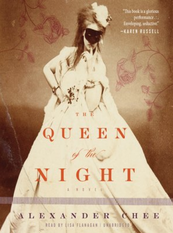A WRITER'S WIT |
MY BOOK WORLD

If there is any performance greater than a tour de force, I don’t know what it would be called, but this novel would surely fall under such a category. I’ve not been this stupefied by a contemporary novel for a long time. And so much to say about it!
This novel begins briefly in America, and it ends softly there. Lilliet (although she deftly goes by many names, as needed) is orphaned in her teens and flees the Midwest for New York City. There she (of course) is taken advantage of by men and for a short time earns money selling herself. But she manages to secure a job with a circus (in part by lying about her abilities) sailing for Europe. Her aim: to connect with her late mother’s relatives in Lucerne, Switzerland. In Paris, however, she makes an adequate living but then because of her singular voice becomes a singer: And again a prostitute. Then a lady in waiting. Then she is trained as an opera singer by an expert. She is wooed by a prince, a famous tenor, a young composer. She backtracks at times, vacating the world of opera, because her voice (determined by experts to be a falcon, a darker-toned soprano) is fragile. Throughout, one wonders how she remains disease- and pregnancy-free, a thought that crosses her own mind:
I somehow had been spared both marriage and children thus far, mostly as a condition of my class, but not entirely. I had been spared worse, as well—the clap, tuberculosis, smallpox, wasting—until now, I had given it little thought. Your health, when you have it, is invisible to you. I only thought of myself as lucky and that this was my only luck. But was I lucky? Or did I have a spiteful womb?” (336).
This self-reflection occurs more than halfway through the book, and Lilliet proceeds to remain marriage- and child-free (by her own desires, in spite of being in love with the composer). It is a comfortable and fortunate condition for her, and it is the author’s way of setting her up to experience an extraordinary freedom for a woman living in the middle of 19th-century France.
And it must be said that Lilliet is a true performer, not a poseur of some kind:
I studied Carmen as if I were in school again. I started a new notebook, like the one I kept for each of the roles in my repertoire. I always began learning my music by copying out the lyrics by hand, and I marked the music above them. My mornings before rehearsal were spent with a pencil and the blank pages of a journal that came with me to the rehearsal, where I made notes, writing down thoughts the director and the conductor gave as well. I translated the libretto in order to understand, as much as possible, what I sang and what, if anything, might come of it” (478).
Whew! And yet, Lilliet knows, as a woman, what her lot in life is:
In this world, some time long ago, far past anyone’s remembering, women as a kind had done something so terrible, so awful, so fantastically cruel that they and their daughters and their daughters’ daughters were forever beyond forgiveness until the end of time” (538).
This thought ties to her very last act in the novel, one I shall not divulge, for it is key to understanding Lilliet and her plight, her ultimate place on earth, as she returns to the US and once again joins the circus (her operatic voice is ruined), Barnum’s circus. She has arrived back where she began what seems a lifetime ago.
Coming Next:
TUES: A Writer's Wit | Katherine Patterson
WEDS: A Writer's Wit | Stephen Crane
THURS: A Writer's Wit | Lois McMaster Bujold
FRI: My Book World | Ottessa Moshfegh, McGlue



 RSS Feed
RSS Feed